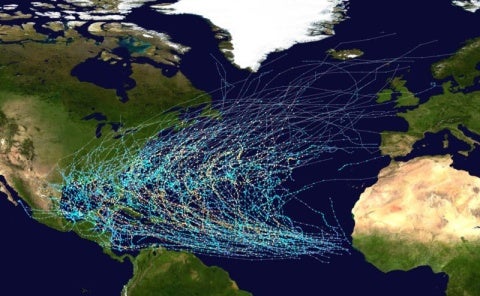 This post is by Lisa Moore, Ph.D., a scientist in the Climate and Air program at Environmental Defense.
This post is by Lisa Moore, Ph.D., a scientist in the Climate and Air program at Environmental Defense.
Last week, scientists published a study about global warming and hurricanes in the U.S. The authors found a weak downward trend in the number of landfalling U.S. hurricanes, but concluded that future trends will depend on the spatial distribution of ocean warming.
In its coverage of the study, the Miami Herald said that "global warming actually is diminishing the number of hurricanes that strike Florida and the rest of the United States – and the phenomenon is likely to continue." This is not exactly what the study said. Here’s the full scoop.


